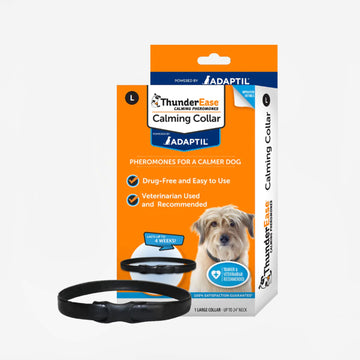Dog Anxiety Collars
Dog anxiety collars can be a great over-the-counter option to help reduce anxiety symptoms. These non-prescription collars work by mimicking calm-inducing pheromones released by mothers nursing their pups.
Frequently asked questions
How do dog anxiety collars work?
How do dog anxiety collars work?
A collar for dogs with anxiety, such as the ThunderEase Calming Collar for Dogs, works by releasing a calming scent that helps calm a dog and make them feel more comfortable. In the case of ThunderEase collars, that scent is specially formulated to mimic the pheromone released by a mother dog while nursing her puppies.
The anxiety collars for dogs come in two sizes to best fit your pet’s neck, and will continue releasing their soothing scent for up to four weeks. One of the key benefits of dog anxiety collars is they can calm your dog anywhere your dog goes.
To achieve the same calming effect at home, consider the ThunderEase Calming Diffuser Kit, which plugs into any standard wall outlet and can easily be refilled every 30 days with the ThunderEase Calming Diffuser Refill.
What are the side effects of anxiety collars for dogs?
What are the side effects of anxiety collars for dogs?
Side effects experienced with the collar for dog anxiety are mild and somewhat rare, especially when compared to prescription medications, and will vary from dog to dog. The most common side effect encountered is skin irritation or mild allergic reactions to the materials used in the collar itself.
Regardless, you should keep an eye on your dog for the first few days of use to ensure that they are reacting favorably to the collar and its scent.
Are anxiety collars for dogs prescription-only?
Are anxiety collars for dogs prescription-only?
Fortunately, most collars for dog anxiety are available over-the-counter, without a prescription. Many dogs have found comfort and security in stressful situations with the help of an anxiety collar. That being said, it’s still a great idea to schedule an appointment with an online vet about your dog's anxiety to create a solid treatment plan.
If you and your vet eventually decide that prescription anxiety medicine is the best treatment for your dog, keep in mind that Dutch members get free shipping on pharmacy orders.
What are the symptoms of anxiety in dogs?
What are the symptoms of anxiety in dogs?
It’s both unfortunate and frustrating that our beloved dogs aren’t able to verbally communicate their fear and anxiety to us like a friend or child would. We must rely on their behaviors to help tell us when there’s an issue that would prompt us to treat dog anxiety.
If you notice that your dog often trembles, shivers, barks, or becomes destructive when facing new people, strange places, loud noises, or loneliness, then you may want to look into treatment.
How do you treat anxiety in dogs?
How do you treat anxiety in dogs?
Treating dog anxiety long-term will usually require a mix of dog-calming aids (like dog anxiety collars and diffusers) and careful attention from the owner. Environmental and/or behavior modification plans are a great way to make sure the stressors don’t continue to set your dog on edge and prevent them from fully enjoying life.
If you think your dog may be experiencing anxiety, you can take this quick online quiz to learn more about the issue and what you can do to help your four-legged friend stay calm and content.


